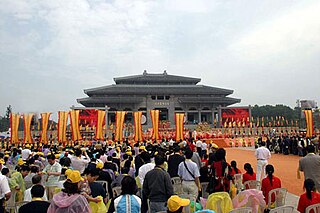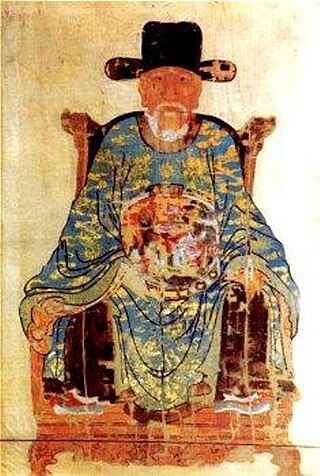
Confucianism, also known as Ruism or Ru classicism, is a system of thought and behavior originating in ancient China, and is variously described as a tradition, philosophy, religion, way of governing, or way of life. Confucianism developed from what was later called the Hundred Schools of Thought from the teachings of the Chinese philosopher Confucius (551–479 BCE). Confucius considered himself a transmitter of cultural values inherited from the Xia (c. 2070–1600 BCE), Shang (c. 1600–1046 BCE) and Western Zhou dynasties (c. 1046–771 BCE). Confucianism was suppressed during the Legalist and autocratic Qin dynasty (221–206 BCE), but survived. During the Han dynasty, Confucian approaches edged out the "proto-Taoist" Huang–Lao as the official ideology, while the emperors mixed both with the realist techniques of Legalism.
Tao or Dao (道) is the natural order of the universe, whose character one's intuition must discern to realize the potential for individual wisdom, as conceived in the context of East Asian philosophy, East Asian religions, or any other philosophy or religion that aligns to this principle. This seeing of life cannot be grasped as a concept. Rather, it is seen through actual living experience of one's everyday being. Its name, Tao or Dao(Chinese ), came from Chinese, where it signifies the way, path, route, road, or sometimes more loosely doctrine, principle, or holistic belief.

Zhu Xi, formerly romanized Chu Hsi, was a Chinese calligrapher, historian, philosopher, poet, and politician during the Song dynasty. Zhu was influential in the development of Neo-Confucianism. He contributed greatly to Chinese philosophy and fundamentally reshaped the Chinese worldview. His works include his editing of and commentaries to the Four Books, his writings on the process of the "investigation of things", and his development of meditation as a method for self-cultivation.

Korean Confucianism is the form of Confucianism that emerged and developed in Korea. One of the most substantial influences in Korean intellectual history was the introduction of Confucian thought as part of the cultural influence from China.

Neo-Confucianism is a moral, ethical, and metaphysical Chinese philosophy influenced by Confucianism, which originated with Han Yu (768–824) and Li Ao (772–841) in the Tang dynasty, and became prominent during the Song and Ming dynasties under the formulations of Zhu Xi (1130–1200). After the Mongol conquest of China in the thirteenth century, Chinese scholars and officials restored and preserved neo-Confucianism as a way to safeguard the cultural heritage of China.

New Confucianism is an intellectual movement of Confucianism that began in the early 20th century in Republican China, and further developed in post-Mao era contemporary China. It primarily developed during the May Fourth Movement. It is deeply influenced by, but not identical with, the neo-Confucianism of the Song and Ming dynasties.
Tu Weiming is a Chinese-born American philosopher. He is Chair Professor of Humanities and Founding Director of the Institute for Advanced Humanistic Studies at Peking University. He is also Professor Emeritus and Senior Fellow of Asia Center at Harvard University.

Xiong Shili was a Chinese essayist and philosopher whose major work A New Treatise on Vijñaptimātra is a Confucian critique of the Buddhist Vijñapti-mātra "consciousness-only" theory popularized in China by the Tang-dynasty pilgrim Xuanzang.
Mou Zongsan was a Chinese philosopher and translator. He was born in Shandong province and graduated from Peking University. In 1949 he moved to Taiwan and later to Hong Kong, and he remained outside of mainland China for the rest of his life. His thought was heavily influenced by Immanuel Kant, whose three Critiques he translated from English, possibly first, into Chinese, and above all by Tiantai Buddhist philosophy.

In the study of comparative religion, the East Asian religions or Taoic religions, form a subset of the Eastern religions. This group includes Chinese religion overall, which further includes Ancestral Worship, Chinese folk religion, Confucianism, Taoism and popular salvationist organisations, as well as elements drawn from Mahayana Buddhism that form the core of Chinese and East Asian Buddhism at large. The group also includes Japanese Shinto, Tenrikyo, and Korean Muism, all of which combine Shamanistic elements and indigenous ancestral worship with various influences from Chinese religions. Chinese salvationist religions have influenced the rise of Japanese new religions such Tenriism and Korean Jeungsanism; as these new religious movements draw upon indigenous traditions but are heavily influenced by Chinese philosophy and theology.

Tang Chun-I or Tang Junyi was a Chinese philosopher, who was one of the leading exponents of New Confucianism. He was influenced by Plato and Hegel, as well as by earlier Confucian thought.
Robert Cummings Neville is an American systematic philosopher and theologian, author of numerous books and papers, and ex-Dean of the Boston University School of Theology. He is Professor Emeritus of Philosophy, Religion, and Theology at Boston University.
Jing zuo refers to the Neo-Confucian meditation practice advocated by Zhu Xi and Wang Yang-ming. Jing zuo can also be described as a form of spiritual self-cultivation that helps a person achieve a more fulfilling life.
Huang–Lao or Huanglao was the most influential Chinese school of thought in the early 2nd-century BCE Han dynasty, having its origins in a broader political-philosophical drive looking for solutions to strengthen the feudal order as depicted in Zhou politics. Not systematically explained by historiographer Sima Qian, it is generally interpreted as a school of syncretism, developing into a major religion, the beginnings of religious Taoism.
"A Manifesto for a Re-appraisal of Sinology and Reconstruction of Chinese Culture" is an essay originally published in China and Taiwan in 1958. The essay's collective authors included Carsun Chang, Tang Chun-I, Mou Tsung-san, and Hsu Fo-kuan, all “New Confucianism” scholars and notable students of Xiong Shili.

Vietnamese philosophy includes both traditional Confucian philosophy, Vietnamese local religious traditions, and later philosophy introducing French, Marxist, Catholic and other influences.

Chinese theology, which comes in different interpretations according to the classic texts and the common religion, and specifically Confucian, Taoist, and other philosophical formulations, is fundamentally monistic, that is to say it sees the world and the gods of its phenomena as an organic whole, or cosmos, which continuously emerges from a simple principle. This is expressed by the concept that "all things have one and the same principle". This principle is commonly referred to as Tiān 天, a concept generally translated as "Heaven", referring to the northern culmen and starry vault of the skies and its natural laws which regulate earthly phenomena and generate beings as their progenitors. Ancestors are therefore regarded as the equivalent of Heaven within human society, and therefore as the means connecting back to Heaven which is the "utmost ancestral father". Chinese theology may be also called Tiānxué 天學, a term already in use in the 17th and 18th centuries.
[In contrast to the God of Western religions who is above the space and time] the God of Fuxi, Xuanyuan, and Wang Yangming is under in our space and time. ... To Chinese thought, ancestor is creator.
Imperial titles were used in various historical Korean states before the 14th century and at the turn of the 20th century: Early Korean states used "great king", "greatest king", and "holy king"; later Korean states used "emperor". Korean monarchs who used imperial titles had political and religious authority over a realm or domain. The Chinese concept of tianxia, pronounced "cheonha" in Korean, was variously adopted and adapted to Korean views of the world from period to period.

Self-cultivation or personal cultivation is the development of one's mind or capacities through one's own efforts. Self-cultivation is the cultivation, integration and coordination of mind, body, and life-world. Although self-cultivation may be practiced as a form of psychotherapy, it goes beyond healing and self-help to also encompass self-development and self-improvement. It is associated with attempts to go beyond normal states of being, and enhancing and endless polishing of a person's capacities and the development of innate human potential.

Confucianism in the United States dates back to accounts of missionaries who traveled to China during the early 19th century and from the 1800's with the practice and Study of Traditional Chinese medicine and acupuncture in the United states by Chinese immigrant Doctors and via trade of technology, science and philosophy from east Asia to Europe and the America's. Since the second half of the 20th century, it has had a increased medical and scholarly interest. Confucianism is also studied under the umbrella of the profession of eight principle Chinese Acupunture and Chinese philosophy. American scholars of Confucianism are generally taught in universities in the philosophy or religions departments. Whether Confucianism should be categorized as a religion in academia or Confucian based traditional Chinese medicine is to be recognised as a legitimate mainstream medicine has been controversial in U.S and abroad.








